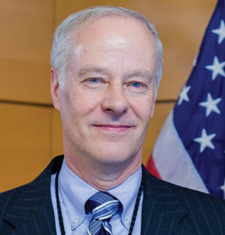Protecting service members from long-term harm
Dr. R. Craig Postlewaite has been working to identify hazards that could cause long-term harm to military members deployed outside the U.S.
Since he retired as an Air Force colonel, Dr. Postlewaite has led teams that have developed a radiation exposure registry following the meltdown at the Fukushima Daiichi Nuclear Power Station in 2011 in Japan, studied the risks presented by pollution from trash pit fires at military bases in Afghanistan and Iraq, and started work on a program that eventually could give health care providers records describing radiation exposures of individual military members and their families.
“We’ve accomplished a lot over the last number of years, there’s no doubt about it,” he said. “It has been extremely challenging, extremely busy, and the pace was always really rapid.”
His team members were guided by the need for their work and by their individual qualifications to “do the right thing,” regardless of difficulty, he said.

In November 2013, Dr. Postlewaite was among nine Department of Defense employees who received the Distinguished Civilian Service Award, given in recognition of “exceptional devotion to duty that leads to significant contributions in policy, science, technology, and administration,” a department announcement states. He is currently the chief of the Public Health Division of the Defense Health Agency.
The son of an Air Force colonel, Dr. Postlewaite spent 26 years in the Air Force following his graduation in 1976 from the Colorado State University College of Veterinary Medicine & Biomedical Sciences, where he was supported by a scholarship that required one year in the Air Force for each of the three years he received the scholarship. He entered the service as a captain in the Air Force Veterinary Corps, through which he worked on zoonotic disease control activities such as food inspection.
Though he initially planned to enter private practice after fulfilling his three-year obligation, he found attractive opportunities every time he had a chance to leave. He stayed even when the Air Force Veterinary Corps disbanded.
About 280 veterinarians were in the corps when Congress voted in 1980 to disband it, according to JAVMA archives. Those veterinarians had options to transfer to the Air Force Biomedical Sciences Corps or the Army Veterinary Corps.
“I came very close to transferring to the Army and was very interested in doing a pathology residency,” Dr. Postlewaite said. “But, the Army wouldn’t promise that to me and said that, basically, I would have to compete with Army veterinarians for the position.”
He did not think that competition would be on even footing, he said.
Instead, by staying in the Air Force as an environmental health officer, his career in the service would include working as a public health officer, teaching as a biology professor in the Air Force Academy, earning a Master of Public Health degree at the Johns Hopkins Bloomberg School of Public Health, and participating in a fellowship in industrial hygiene at the National Institute for Occupational Safety and Health. With each assignment, he said that he performed the best work he could, which provided more opportunities “and allowed me to progress to the level that I’ve reached today.”
After retiring from the Air Force, he worked as a contractor and then as a civil servant for the Defense Department in roles focusing on the health of military members deployed beyond U.S. borders. He said deployed soldiers, sailors, airmen, and Marines have better health protection today than they’ve ever had in the past.
“We’ve got very brave men and women that sign up to go into harm’s way within the military, and they’re there to defend the national interest at all costs—they’re there to take a bullet or be injured by a bomb, not that they want to be—but they understand that that’s what comes with doing that kind of work,” he said.
But those military members expect the DOD to protect them from the environmental risks of deployment, an aspect of service that many do not consider as part of their agreement with the government when enlisting.
Dr. Postlewaite described receiving the Distinguished Civilian Service Award, relative to the rest of his career, as “a cherry on top of a sundae that has been good all through the years.” He said the award is the most exciting because it shows the secretary of defense has identified public health work as important, requiring commitment to do well for those working for and in the department.
“I think it should give all of our members of our public health team a huge measure of satisfaction that the work that they do is valued,” he said.